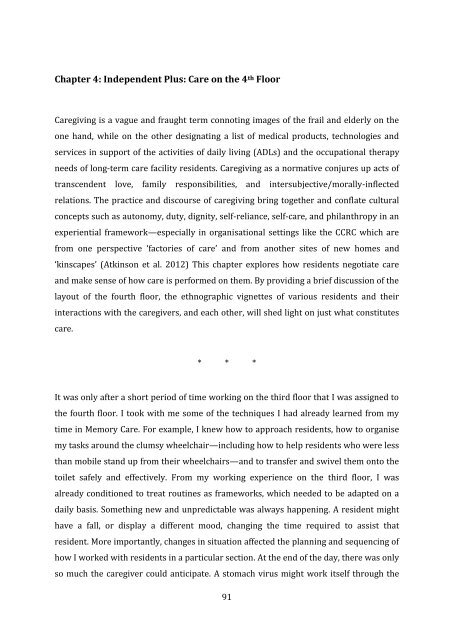Philip Y. Kao PhD thesis - Research@StAndrews:FullText
Philip Y. Kao PhD thesis - Research@StAndrews:FullText
Philip Y. Kao PhD thesis - Research@StAndrews:FullText
Create successful ePaper yourself
Turn your PDF publications into a flip-book with our unique Google optimized e-Paper software.
Chapter 4: Independent Plus: Care on the 4 th Floor<br />
Caregiving is a vague and fraught term connoting images of the frail and elderly on the<br />
one hand, while on the other designating a list of medical products, technologies and<br />
services in support of the activities of daily living (ADLs) and the occupational therapy<br />
needs of long-term care facility residents. Caregiving as a normative conjures up acts of<br />
transcendent love, family responsibilities, and intersubjective/morally-inflected<br />
relations. The practice and discourse of caregiving bring together and conflate cultural<br />
concepts such as autonomy, duty, dignity, self-reliance, self-care, and philanthropy in an<br />
experiential framework—especially in organisational settings like the CCRC which are<br />
from one perspective ‘factories of care’ and from another sites of new homes and<br />
‘kinscapes’ (Atkinson et al. 2012) This chapter explores how residents negotiate care<br />
and make sense of how care is performed on them. By providing a brief discussion of the<br />
layout of the fourth floor, the ethnographic vignettes of various residents and their<br />
interactions with the caregivers, and each other, will shed light on just what constitutes<br />
care.<br />
* * *<br />
It was only after a short period of time working on the third floor that I was assigned to<br />
the fourth floor. I took with me some of the techniques I had already learned from my<br />
time in Memory Care. For example, I knew how to approach residents, how to organise<br />
my tasks around the clumsy wheelchair—including how to help residents who were less<br />
than mobile stand up from their wheelchairs—and to transfer and swivel them onto the<br />
toilet safely and effectively. From my working experience on the third floor, I was<br />
already conditioned to treat routines as frameworks, which needed to be adapted on a<br />
daily basis. Something new and unpredictable was always happening. A resident might<br />
have a fall, or display a different mood, changing the time required to assist that<br />
resident. More importantly, changes in situation affected the planning and sequencing of<br />
how I worked with residents in a particular section. At the end of the day, there was only<br />
so much the caregiver could anticipate. A stomach virus might work itself through the<br />
91
















